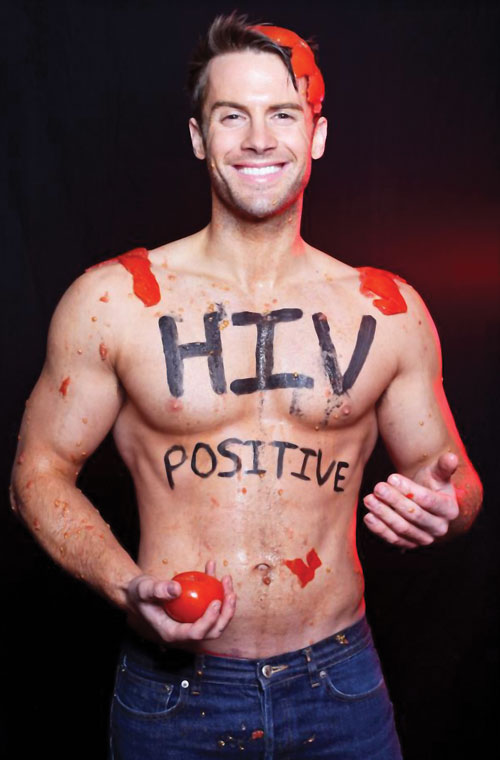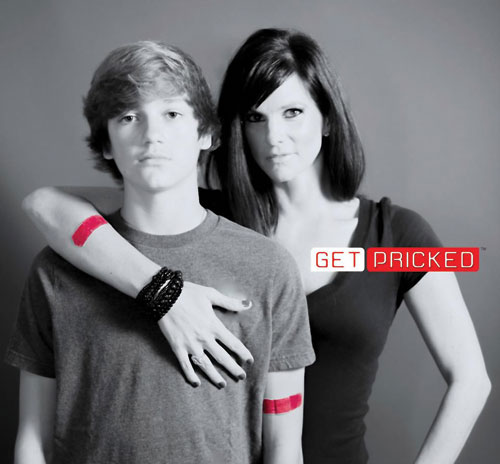Tyler Curry’s editorial campaign, The Needle Prick Project, aims to start a conversation about being HIV-positive for today’s generation

ABSOLUTELY FABULOUS | Tyler Curry has been criticized for using the word ‘fabulous’ in connection with his HIV status, but he simply wants people with HIV to live fabulous lives. (Photo by David Leggett)
Tyler Curry understands the stigma of living with HIV.
Although he’s healthy and expects his medications to keep him that way for a long time, he spent a year teaching kindergarten in South Korea before returning to Dallas. After his diagnosis last year, he realized he can’t go back.
South Korea won’t issue work visas to people infected with HIV.
When Curry, 28, learned he was HIV-positive, he became depressed. One night, he woke up at 3 a.m.
“I couldn’t sleep anymore,” he recalled. “I opened my laptop and started spilling it.”
The article he wrote, “HIV-positive, unapologetic and fabulous,” was published by The Huffington Post and The Advocate in November.
That article sparked a series of edgy columns about living his life with HIV and about other people infected or affected by the virus. Accompanied by a stylized black-and-white photo with a red Band-Aid and “Get Pricked” logo, the combination of stories and photos became the editorial campaign The Needle Prick Project.
While the placement of the red Band-Aid indicates a recent blood draw for an HIV test, Curry said getting pricked means more than getting tested. He wants to end the stigma of HIV by starting a conversation.
The reaction has definitely been mixed.
He’s been criticized for using the word “fabulous” in connection with his HIV status. He’s been criticized for being too flippant. He’s been criticized for disrespecting a generation that died of AIDS. And he’s been criticized for wanting to reduce the stigma of HIV.
Curry said his objective is to open the conversation and prevent the spread of the disease. Reducing stigma and decreasing fear is his first goal. Living with fear is a health risk to the person infected. And when people feel stigmatized, he said they’re less likely to reveal their status to a potential partner for fear of rejection.
That’s part of the conversation Curry encourages.
He called waiting to reveal his HIV status to someone he’s going out with “the third date cliché.”
“Disclose before planning a first date,” he said.
That way, he said, if he’s rejected, he’s not invested. He wants people to know up front about his status because someone once did that for him.
“I thought, how respectful of him to tell me,” he said.
Curry said he wants people with HIV to live fabulous lives. But so much of what’s said about HIV revolves around fear. And people don’t talk about it.
Once fear and stigma are gone, Curry said it’s easier to increase awareness and encourage more people to get tested.
“He’s the current voice of HIV culture,” Dallas psychologist Keith Bernardo said.
Before The Needle Prick Project, Bernardo only knew Curry in passing until he approached him about his first article. He called Curry a breath of fresh air in his approach to dealing with HIV.
“He was incredibly compelling,” Bernardo said. “He was doing the opposite of retreating.”
Rather than disrespecting a generation of people who died of AIDS, he’s speaking for his generation, he said. He called Curry edgy rather than flippant.
“The redefinition felt brave to me,” he said. “He’s attacking it from a current medical position.”
Bernardo said that in his practice he saw someone whose attitude was, “Phew. Just got the news I’m positive. Now I can have sex anyway I want.”
He said that is not Curry’s message.

PRACTICAL PARENT | Kim Landry, right, posed for the project with her son to teach him about the disease. She said other parents don’t talk about HIV, but some have started to since seeing their picture. (Photo by David Leggett)
Being fabulous after diagnosis doesn’t mean Curry’s encouraging people to become infected, Bernardo explained. But being safe and revealing his status to protect his partner does make him pretty fabulous.
Curry said that being unapologetic means not blaming anyone else for his infection but not apologizing for having it. It’s part of who he is and that will never change. He knows he won’t live a healthy life living with stigma and blame hanging over his head.
Curry asked Terry Loftis, former Resource Center Dallas board president, to be photographed for the project because he had worked on prevention in the community.
“What I love about The Needle Prick Project is someone in Tyler’s age group came out and talks about it,” he said.
He said the message is prevention. That’s not a message he’s hearing among gay men in their 20s — to continue practicing safe sex, Loftis said.
He said Curry’s approach might seem shocking to someone whose entire circle of friends died of AIDS.
“Someone in his 20s isn’t going to have the same perspective,” Loftis said. “But it’s not a slap in the face. He’s putting a face on AIDS, and I admire him for what he’s doing.”
Kim Landry, who lives in Plano, said her best friend is HIV-positive. So she did a Get Pricked photo shoot with her 15-year-old son.
After the pictures were posted, she said she got a huge response.
“People don’t talk to their kids about HIV,” she said. “Especially suburban families.”
After the picture came out, the reaction from people around her was mixed. Her son’s best friend’s parents told him all gays are going to hell. People at her son’s school assumed he was gay. Things got so bad, she said, she pulled him out of his Plano school and transferred him to Frisco.
But after other parents saw the picture, they told her that it was OK to have the talk.
“I had some friends say it’s not something they thought of talking about with their kids,” Landry said.
She agreed with Curry on the idea of eliminating stigma.
“It’s just a part of life,” she said. “It’s not something you asked for.”
Landry said she was bothered by some comments she’s heard that accuse Curry of making light of HIV by calling his life fabulous or using sex to sell his project.
“In no way is he trying to make HIV sexy,” she said. “I’m divorced and I’m the same fabulous person now that I was before. Am I making light of being divorced? Absolutely not.”
Curry said he’s writing for his generation with no disrespect for all the people who died of AIDS before him.
But he approaches his infection from a modern medical perspective.
“My doctor said at most I’d lost two years off my life,” he said.
The reality for his generation is the disease is manageable with medication for most people, and he believes he can do anything now that he could have done before.
Well, almost anything.
After college, Curry worked for the Dallas city manager’s office. When he left to get an advanced degree, he was assured that a better job would be waiting for him when he graduated.
But when he finished his degree in 2009, city hiring was frozen.
That’s when he decided to travel through Asia and got the job teaching in South Korea. He understands that’s not something he could do now because, unlike other treatable diseases, HIV still carries a stigma.
He knows doors have been shut for other people with HIV as well. He hopes that his work to reduce the stigma will once again open that door for him and for others.
A fundraiser for The Needle Prick Project will be held at 7 p.m. March 8 at Alexandre’s, 4026 Cedar Springs Road. For more information about the project, go to www.Facebook.com/GetPricked.
This article appeared in the Dallas Voice print edition March 1, 2013.

